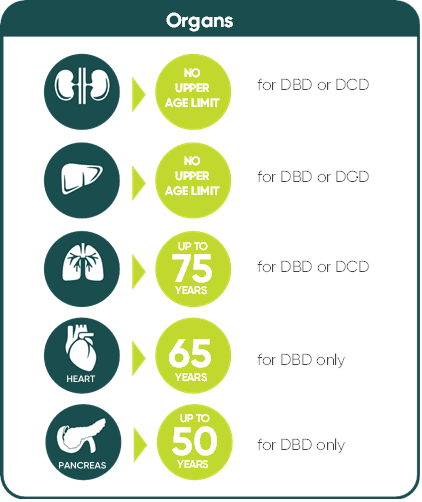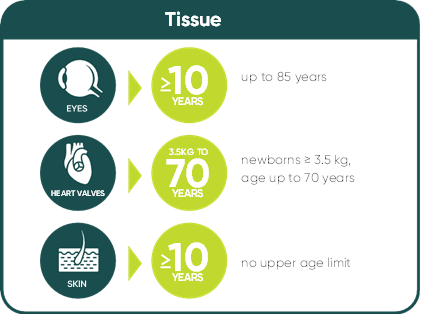2.1 Types of donation
Donation following brain death (DBD) is possible in all ICUs in New Zealand and Donation after Circulatory Death (DCD) in credentialed ICUs. Eye donation can be facilitated in all hospitals and other tissue donation (heart valves and skin) should be discussed with the donor coordinator.
The organs and tissues that can be donated will depend on:
- the patient’s age
- past medical and social history
- the cause and circumstances of death
- the current condition of the organs and tissues.
Donation following brain death (DBD)
Patients of all ages who are in the ICU on ventilatory support, in whom brain death is anticipated or has been determined, are potential organ and tissue donors.
DBD can include:
- kidneys
- liver
- heart or heart valves
- lungs
- pancreas
- skin
- eyes (corneas and sclerae).
For more detail see Section 3.
Donation after circulatory death (DCD)
Ventilated patients of any age from whom intensive therapies are to be withdrawn, irrespective of diagnosis, are potential DCD organ and tissue donors.
DCD can include:
- kidneys
- liver
- lungs
- heart valves
- skin
- eyes (corneas and sclerae).
For more information see Section 5.
Tissue-only donation
The potential for tissue donation should be considered for all patients, especially if the family has volunteered donation. Please contact the donor coordinator, even after the patient has died, as tissue donation does not have to take place immediately.
For more information see Section 6
Donation for research
Specific consent is required for donation of organs and tissues for research. Consent is sought only for projects approved by an ethics committee.
2.2 Age criteria for donation
Below are the age criteria for organ and tissue donation.


2.3 Medical contraindications to donation
There are very few circumstances where a potential donor cannot donate any organ or tissue.
ODNZ recommends early consultation with the donor coordinator in any circumstance where possible contraindications to donation (eg a history of malignancy) appear to exist. This is to prevent the situation where donation is being discussed with the family when donation is not possible, and to also avoid ruling out potential donors.
The donor coordinator will discuss the details of the patient with the transplant services and tissue banks and promptly let you know whether donation is completely contraindicated or is possible for specific organs and tissues.